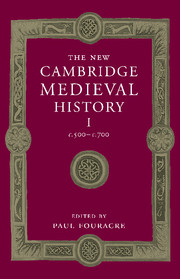Book contents
- Frontmatter
- Introduction: the history of Europe 500–700
- 1 The later Roman Empire
- 2 The Barbarian invasions
- 3 The sources and their interpretation
- PART I THE SIXTH CENTURY
- PART II THE SEVENTH CENTURY
- PART III THEMES AND PROBLEMS
- List of Primary sources
- Bibliography of secondary works arranged by chapter
- Index
- Frontispiece"
- Plate section"
- Map 3 Gaul/Francia in the sixth and seventh centuries"
Introduction: the history of Europe 500–700
Published online by Cambridge University Press: 28 March 2008
- Frontmatter
- Introduction: the history of Europe 500–700
- 1 The later Roman Empire
- 2 The Barbarian invasions
- 3 The sources and their interpretation
- PART I THE SIXTH CENTURY
- PART II THE SEVENTH CENTURY
- PART III THEMES AND PROBLEMS
- List of Primary sources
- Bibliography of secondary works arranged by chapter
- Index
- Frontispiece"
- Plate section"
- Map 3 Gaul/Francia in the sixth and seventh centuries"
Summary
Hegel’s notion of a state of transformation, in which the present negates the past in favour of the future, is well suited to this period of European history. At our starting point around the year 500, we may still characterise European culture as ‘late antique’; by the year 700 we are firmly in the world of the Middle Ages. A transformation has apparently occurred. The idea that it is developing consciousness that calls changes into being is not far off the mark either, if we think about the triumph of the Christian future over the pagan past and the reconfiguration of culture and institutions around newly hegemonic religious beliefs and practices. This conception of history is avowedly teleological: it is ultimately more interested in what things were becoming than in what they were in their own terms and in their proper context. A survey such as this one, standing at the beginning of a series which looks at history over a 1000 year period, must of course be aware of future development in order to understand the nature and significance of contemporary phenomena. At the same time, however, it must equally be aware that what makes hindsight or overview possible is precisely a detailed knowledge of the past in its own terms. The balance between overview and detail must nevertheless be judicious. The present volume aims for balance in this way. It is organised on a chronological and geographical basis, from which a series of particular histories provide the background to a final section of thematic overviews.
- Type
- Chapter
- Information
- The New Cambridge Medieval History , pp. 1 - 12Publisher: Cambridge University PressPrint publication year: 2005
- 3
- Cited by



